Ideas, come out!
How the first state-run business incubator for school students operates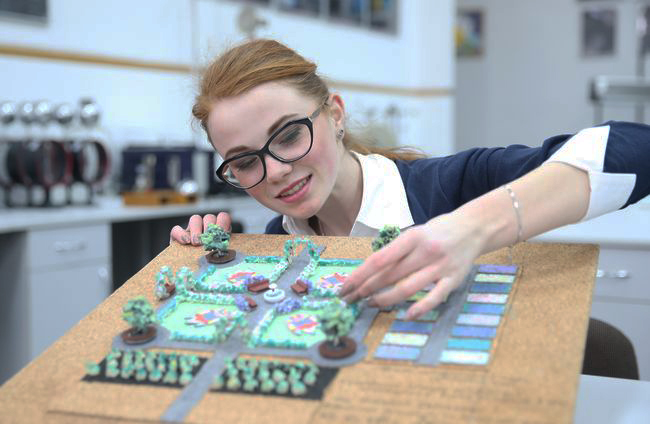
Ukrainian school students annually create up to 500 inventions. These designs can facilitate rescue operations, say, during fires, automate certain business processes or improve the state of the environment. But most of these ideas never come to fruition. Their authors lack knowledge of how to submit their creative products to an investor and have no way to contact these investors.
Many inventors are grouped in the Junior Academy of Sciences (JAS). Therefore, the JAS initiated the first state-run business incubator for high school students, which is called the UF Incubator and is being created now. The name stands for the Ukrainian Future Incubator. The project went operational in February, but not to the full extent yet. At present, participants in the incubation program attend the ManLab laboratory once a month, where they learn the basics of marketing, business plan making, and idea promotion. Meanwhile, at the end of this year, a large facility at 13, Chokolivskyi Boulevard, the building once housing the Yerevan Cinema, will open and make available spaces for lectures and other educational events, prototyping, etc.
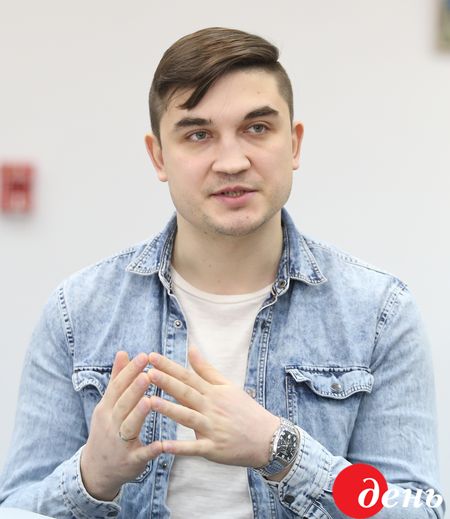
Vitalii Lisovyi
Head of the UF Incubator Vitalii Lisovyi told us about the project’s current condition and showed how it would look like in six months. Meanwhile, the first participants of the incubation program used us for training in presenting their projects.
RUBBER WASTE
15-year-old Danylo Kovalenko, who is studying at the Polytechnic Lyceum of Kyiv Polytechnic Institute (KPI), wants to grant a new life to used tires. “No one has ever invented such a thing! The technique involves deep cooling of the tires with liquid nitrogen, and then subjecting them to ultrasound, which breaks them into small bits. These bits can be used to make rubber products of every kind,” the high school student explained.
Now the tires are either stored or burned. It is harmful to the environment, and potentially reusable raw material is lost as well. Kovalenko’s technique is environmentally friendly, cost-effective, and has no analogues.
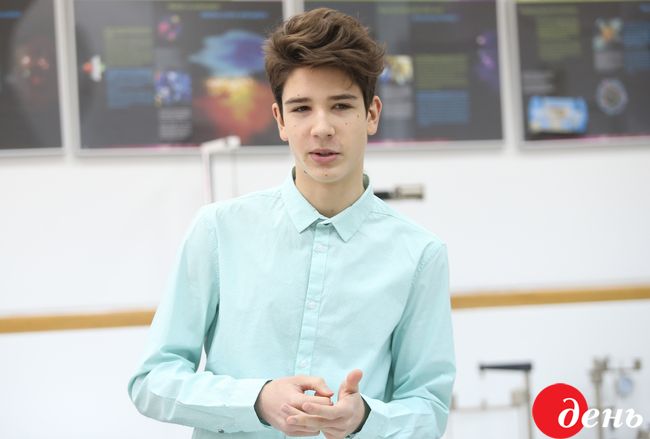
“Another advantage of this technique is the absence of direct contact between the machine’s parts and tires. After all, for example, there is a technique for processing of tires in a kind of ‘meat grinder.’ There is a very high wear and tear of equipment involved. Our machine, meanwhile, works remotely, and we do not have to replace the worn parts every month,” the student added. “There is another remotely working technique, which involves processing tires with ozone, but it is environmentally harmful and quite dangerous because ozone is an unstable substance. Therefore, I think our technique faces no real competition.”
Kovalenko has already tested his technique and even patented it. But the power capacity used during the test was low. “We worked with installations having power output of 50 and 250 watts, although the test requires at least 4,000 watts to make everything obvious. Such installations are very expensive, and we need investment to get them. But this technique works,” the student assured us.
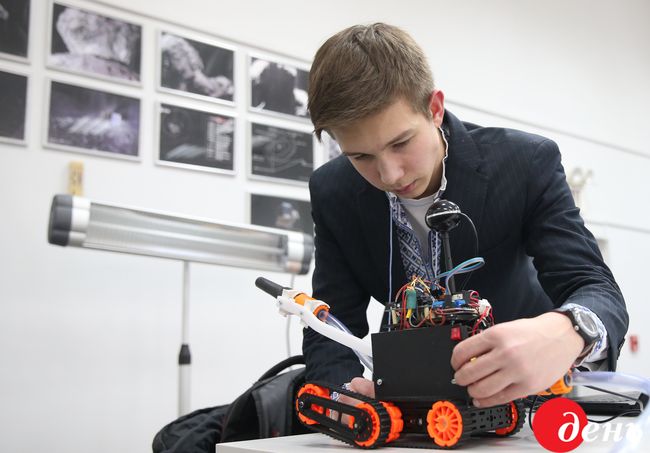
The designer has developed the concept of a plant where tires would be processed by ultrasound. But he needs to carry out tests on powerful installations first, and calculate how many tires can be processed per hour. Kovalenko has lately written to international tire-making companies to interest them in his technique. The kid hopes that the business incubator will help with the search for an investor and promotion of the project.
FOR THE YOUNGEST INNOVATORS
It is believed that the first business incubator appeared in the US in the late 1950s, it was founded by Joseph Mancuso. It became a trend in the 1990s. “Globally, there are profit-making business incubators that are created by private companies, and there are those that function in educational institutions,” Lisovyi said. “Most leading US universities, such as ones located in Massachusetts or Florida, have business incubators for students who can implement their projects there. Almost all countries of the EU have a developed network of such incubators: Estonia, Finland, Germany, Poland, etc. We are an academic institution, we are engaged in the science education of highschoolers, therefore creating a business incubator in our structure is logical.”
It is noteworthy that the UF Incubator focuses on highschoolers, while similar entities typically work with college students.
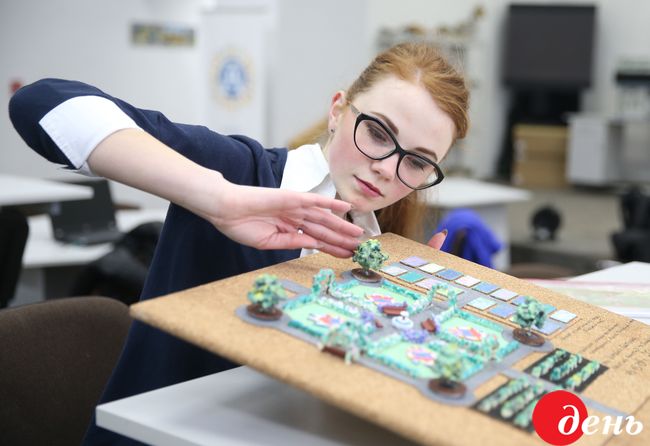
“For many years, the JAS has conducted a competition for youth innovation projects, called the Future of Ukraine. There, kids annually present their best inventions, prototypes, projects. Actually, this competition has inspired the creation of a business incubator. The kids who take part in it are talented and have ready-made solutions that can compete with those proposed by adults. Their inventions have to do with robotics, instrument-making industry, materials science, electronics, etc. But often enough, these kids do not have the opportunity to implement their projects in the business environment, commercialize them,” Lisovyi continued. “The main task of our business incubator is to help kids gain business education skills. They want to know how to present their product, how to persuade an investor to finance a project, how to work in a team, which promotion strategy to choose, and so on. Our task is also to help kids to patent their designs.”
“IF YOU HAVE A COOL IDEA, YOU MAY COME AND WORK HERE”
The manager showed us the technical passport of the location which will appear in Chokolivskyi Boulevard. “There will be a coworking there, where kids who would get into the incubation program will be able to work. They will be able to use office equipment, have a place to work. There will also be a film lecture hall seating 250, which will host lectures, training sessions, meetings with successful startuppers,” recounted the head of the UF Incubator. “The prototype laboratory will operate there, with 3D printers, a soldering station, and milling machines available. Our experts will help everyone to use it.”
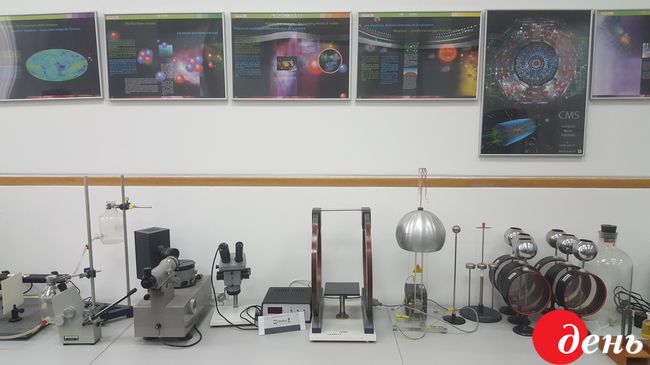
The UF Incubator will be able to host eight teams at the same time which will be selected by competition. Each team will include 8 to 10 participants. “However, if you do not belong to a team, but have a cool idea, you may come and work here, it is not a problem,” Lisovyi added. The incubation program will last from 3 to 10 weeks, totally depending on the level of readiness of the project and the composition of the team that will work on it.
While the center is under construction, young designers are attending training sessions and lectures. The next event will be held in late March and will be devoted to fundraising. And in the summer, the incubator team wants to hold a startup school. To select participants, it will announce a competition. If one has an interesting idea, they can apply, and experts will select the most interesting projects.
“DESIGNS SHOULD MAKE LIFE EASIER OR PROTECT IT”
While we were talking with Lisovyi, a student of KPI’s Polytechnic Lyceum Serhii Lysin approached us. The kid, who is 14, is developing a fire-fighting robot with a computer vision-based homing system.
“We have analyzed the existing prototypes of fire-fighting robots and seen that it is difficult to control them. A person must be present when they are extinguishing the fire. Therefore, we have decided to automate this process a bit and created a computer vision system, which allows the robot to autonomously look for a fire and extinguish it,” Lysin described his idea. A prototype of the robot stood next to him, and the kid connected it to the computer and showed us how it worked. Of course, we did not ignite a fire beforehand.
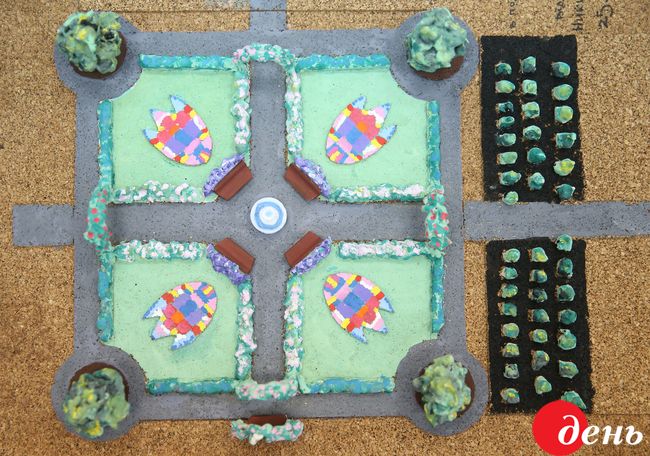
The designer translated an RGB image that reflected the way we see in normal life into the HSV format. The robot reacts to moving red contours, which it identifies as a fire. On the monitor, they look green. Lysin also showed how it was tested in conditions approximating real life. A small robot travels fast and looks for a fire, and when it identifies one, it uses a firefighting hose to smother it.
“So far, people have to be present for some time when extinguishing fires, but we are improving the process,” the student commented. “It is just a prototype. We want to add another plane for the computer vision system, to design a case for it. To use such a robot in forests and at large enterprises, oil terminals, we need to make it bigger. Also, I am learning a new programming language right now, and we will create a better model using it.”
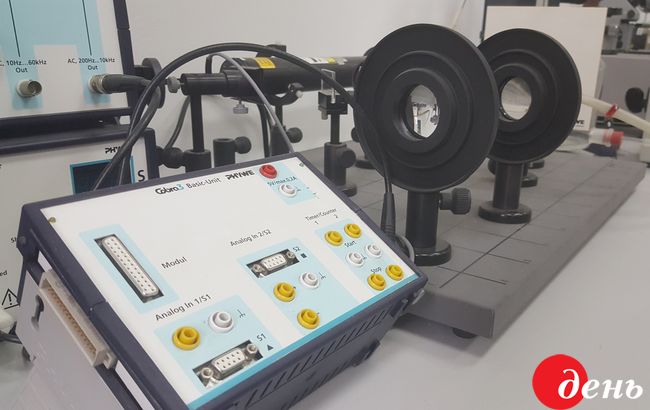
Lysin worked on this project together with his research adviser for several months. He had invented some designs before, but called them “less serious.” However, all of them were intended to make rescue operations work better. “My first idea was a demining robot. I wanted to make a device that would go about carrying a metal detector and looking for mines. Every mine has iron inside. I thought that it was possible to make a metal detector that would find mines, and it would be safer for humans. But I then faced many problems designing it, and realized that it would be unrealistically expensive,” the kid recalled. “Then I and my partner came up with a modular rescue robot. It was like a caterpillar that could get into hard-to-reach places and look for people. I think that all designs should make life easier or protect people.”
A NEW APPROACH TO GARDENING
The projects of the first students of the UF Incubator are not only about machines. Den covered before the story of Ukrainian gardening beginning in the hills around the Kyiv Monastery of the Caves. The 11th-grader Svitlana Shuhailo created a model of the Paradise Garden, which she proposes to plant on the monastery’s grounds.
“The idea occurred to me when I walked around the Kyiv Caves Sanctuary and stumbled upon a not very attractive tract. There were lots of construction debris there. I thought: ‘Why not create a garden in this place, which would become an ornament of the city?’” Shuhailo shared her thoughts with us.
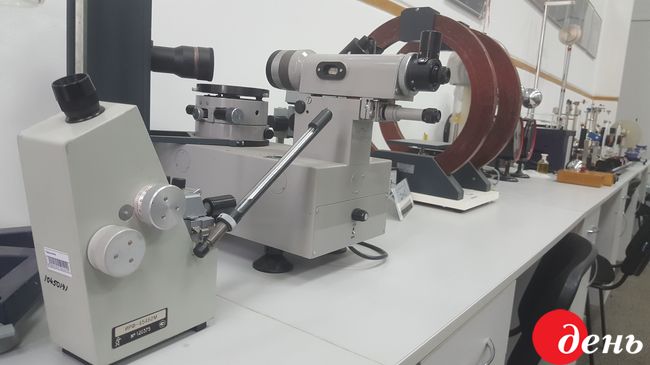
While attending the JAS, the highschooler wrote a paper on the basic principles of the organization of monastery gardens from the Middle Ages to the Baroque Age. The garden which Shuhailo proposes to create in Kyiv is to be formed along the same principles. “This is an ideal resting place for everyone! One can sit near the fountain and feel the aroma of lavender planted next to it. People who are tired of urban life can retire into rose-lined pergolas. There is also a medicinal herb garden within it, featuring spicy aromatic plants. There should be fruit trees and berry shrubs there as well: apple trees and raspberry shrubs, with different species of currants planted along the perimeter of garden trails. Each quarter of the garden should have a mixed border, a flower bed that changes with every season,” the highschooler said while conducting a virtual tour.
The girl observed that potentially, the garden could even be profitable as a source of plant material for all kinds of tea, soap, etc. Also, every plant here has a symbolic meaning.
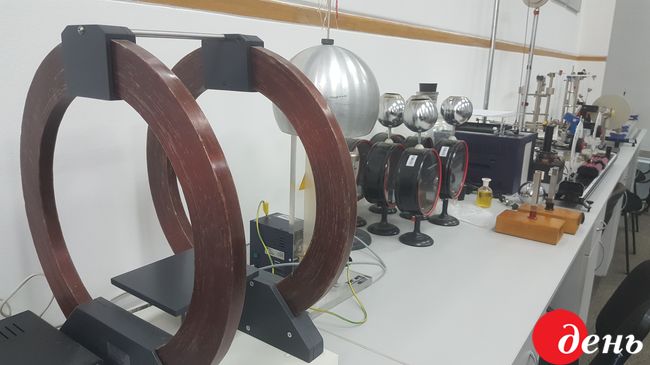
“I brought this project to the Kyiv Startup Festival last year, and it became clear that people needed a product that brings profits right now,” Shuhailo stated. “A garden is a bit different, as the implementation of such a project takes time. That was why I got interested in the business incubator: having an idea is nice, but who needs it if you cannot convey its importance? In my case, it is the fact that one can make money also through gardens, while bringing benefits to people.”
“ATTRACTING OUR BUSINESSPEOPLE WOULD BE COOL”
Lysin has a similar motivation. “The incubator lets me promote my project in the future. Because if I invent something, and then sit at home and do not tell anyone about it, it would be illogical,” the boy mused.
Private incubators do exist in Ukraine, but their approach is different from that of the UF Incubator. Lisovyi said: “As a rule, private business incubators want to have something real that can be put into production tomorrow. We want to help develop the idea. We choose the best and help them.”
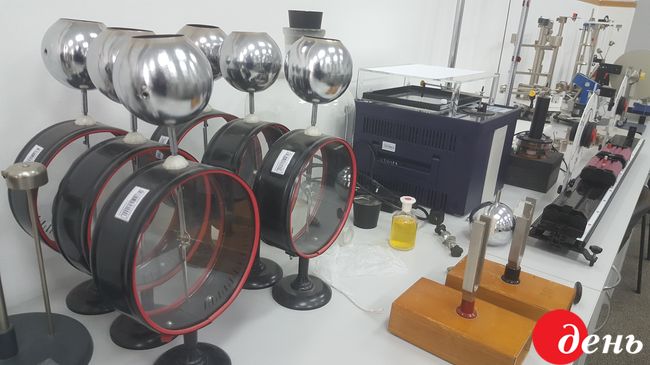
Some projects of JAS students have already found support from investors and grown into innovative companies. But these are isolated cases, and the UF Incubator wants to see more of them. Lisovyi optimistically maintained that projects created by Ukrainian school students might potentially be of interest to businesspeople from many countries. But he added: “First of all, it would be great for the nation if Ukrainian businesspeople started investing in us. There are technology companies in Ukraine that may be interested in such designs.”
Newspaper output №:
№15, (2018)Section
Close up





